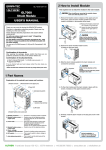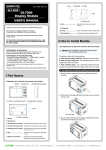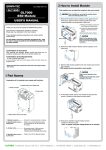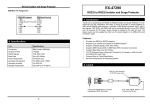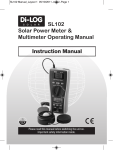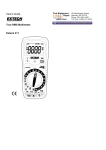Transcript
GL7-HV-UM-151 GL7-HV GL7000 High Voltage Module USER’S MANUAL Thank you very much for buying this GRAPHTEC product. This item is a standalone measuring module. Please use it by installing it on the main module . These directions describe preparations and cautions before measurement. For safe use, please make sure to read “4 Regarding Maximum Input Voltage” For the details concerning operation procedures etc., read the User’s manual recorded on the CD-ROM (included with the main module) You can use in GL7000 firmware (V1.10) and GL-Connection(V1.10) or later. For details, please read the "GL7000 upgrade method" included in CD-ROM (bundled GL7-HV). 2 How to Install Module This explains how to attach the module to the main module. 3 How to Connect to Analog Signal Terminal This explains how to connect the input cable. When installing or removing the module, please make sure that the power is off. 1, Remove the fixation screws (4 places on the upper part and lower parts), place the alarm module parallel to the main module and slide it in the direction of the arrow. 4 (2) Loosen the drop-off prevention screws on the upper part in 2 places. 1 2 High-voltage terminal (Terminal -: Low voltage terminal (Terminal for inputting the high-voltage side of the input signal) for inputting the low-voltage side of the input signal) + (1) Remove the fixation screws from the 2 places on the lower part. 3 +: - Slide it in the direction of the arrow. If you pry it at an angle there is a risk of damaging the connector. During wiring, confirm that the signal's supply source is turned OFF to prevent electrical shocks. Also, position the GL7000 input cable away from any power lines and ground cables. Voltage input Confirmation of the attached items. • User’s manual (this book): 1 • Upgrade CD-ROM: 1 If by any chance faults are found, please contact the store where you bought the item. 1 3, Slide the high voltage module parallel to the main module and connect the connector. Connector 3, Power LED Nail To avoid break-downs or short-circuiting accidents, please make sure to abide by the items written below. 4, Fix the high voltage module and the main module in place with the screws. (4 places on the upper and lower parts) 2 4 4, Module fixation screw (Lower part) 5, Analog signal input terminal 1, Module connector.............. Connector for connecting all kinds of modules. 2, Module fixation screw....... Fixation screw for the adjoining module. (Upper part) To prevent drop off, do not remove from the module. 3, Power LED.......................... The Power LED will light up green when the power has been turned on and the module has been recognized. 4, Module fixation screw....... Fixation screw for the adjoining module. (Lower part) Terminal for inputting analog measurements. GND terminal • GND terminal Grounding Using the filter function of the instrument Setting the filter to anything but OFF on the main body's input settings menu. Insulated BNC cable (RIC-142/143 cable is recommended.) 4 Regarding Maximum Input Voltage 2, Module fixation screw (Upper part) 5, Analog signal input terminal.. Insulated BNC Connector Slide it in the direction of the arrow. Inserting it at an angle may cause damage to the nails. 1 Part Names 1, Module connector Make absolutely sure to ground the chassis GND of the measuring object Absolutely making sure to ground the chassis GND of the measuring object to a favorable ground may have an effect. Connecting the chassis GNDs of the measuring object and the instrument Connecting the chassis GND of the measuring object and the GND terminal of the main module with an electrical cable as short and thick as possible, and further gaining potential equalization by grounding it may have an effect. 2 * Please note that items mentioned in this book may change without prior notice. Explanation of the module's part names and functions. • • Equipment to be measured 2, Remove the high voltage module's fixation screws (2 places on the lower part). After opening the package, please confirm that there are no problems (scratches and dirt) on the exterior before use. In case the measured values fluctuate due to exogenous noise, the following measures are recommended. (Depending on the type of noise, the result may change.) (3) Removing the alarm module. Alarm module Confirmation of the exterior 5 Noise Countermeasures • 1 4 Maximum input voltage In case the input voltage exceeds the specifications, the circuit at the input part will break down so even if the input voltage exceeds the specifications only for an instant, please don't input. Please take care that no static electricity is applied on the analog signal input terminal. <Input terminal (+) /Input terminal (-) interval (A etc. on the figure below)> Maximum input voltage : 1000Vp-p <Input terminal (-)/Input terminal (-) interval (B etc. on the figure below)> Maximum input voltage: 300VACrms Withstand voltage: 2300VACrms/1minute <Input terminal (-)/GND terminal interval (C etc. on the figure below)> Maximum input voltage: 300VACrms Withstand voltage: 2300VACrms/1minute 3 5, Similarly, install the alarm module on the last part and fix it with screws. 2 •• 1 3 During installation, a 4kgf.cm screw tightening torque is recommended. (Screen for when the optional display module is connected) For details, please refer to the User’s manual recorded on the CD-ROM (included with the main module) 6 Specifications GL7-HV (High Voltage Module) specifications Item Input ch number Input terminal shape System Sampling interval Contents 2 ch/1 module Insulated BNC Connector All ch insulation, simultaneous sampling, unbalanced input 1, 2, 5, 10, 20, 50, 100, 200, 500 usec, 1, 2, 5, 10, 20, 50, 100, 125, 200, 250, 500 msec, 1, 2, 5, 10, 20, 30 sec, 1, 2, 5, 10, 20, 30 min, 1hour Built-in RAM 2,000,000 data Input coupling DC, AC, DC-RMS, AC-RMS Measurement range DC, AC : 2, 5, 10, 20, 50, 100, 200, 500, 1000V F.S. DC-RMS, AC-RMS : 1, 2, 5, 10, 20, 50, 100, 200, 500Vrms F.S. Crest Factor: (Range between 1and 200Vrms) 4 or less (Range of 500Vrms) 2 or less Measurement accuracy DC, AC : ±0.25% of F.S. (23℃±5℃) DC-RMS: Sine wave ±0.5% of F.S. (20Hz≤F≤1kHz) * 30 minutes more after ±1.5% of F.S. (1kHz<F≤20kHz) power-up AC-RMS: Sine wave ±0.5% of F.S. (100Hz≤F≤1kHz) GND connection ±1.5% of F.S. (1kHz<F≤20kHz) Filter Line (DC only) Response time: 500ms or less (Crest Factor 4 or less) A/D converter System: sequential comparison system Resolution: 16-bit Effective Resolution(DC,AC) : Approx. ±Range 1/40,000 (DC-RMS,AC-RMS) : Approx. Range1/20,000 Temperature Gain: ±0.01% of F.S./℃ coefficient Zero: ±0.02% of F.S./℃ Input resistance 1 MΩ ±5% Input signal source 1 kΩ or less resistance Maximum input Input terminal(+) /Input terminal (-) interval : 1000 Vp-p voltage Input terminal(-) /Input terminal (-) interval : 300 VACrms Input terminal (-)/GND terminal interval: 300 VACrms Withstand voltage Input terminal(+) /Input terminal (-) interval: 2300 VACrms/1 minute Input terminal (-)/GND terminal interval: 2300 VACrms/1 minute Insulation resistance Input terminal (-)/GND terminal interval: 50 MΩ or more (at DC500 V) Common mode rejection ratio 90 dB or more (50/60 Hz signal source 300Ω or less) S/N (Noise) 48 db or more (+/- at short) Frequency response DC Coupling : DC~200 kHz (+1/-3 dB) AC Coupling : 4 Hz~200 kHz (+1/-4.5 dB) Filter LPF : OFF, Line (1.5 Hz), 5 Hz, 50 Hz, 500 Hz, 5 kHz, 50 kHz (Attenuation) -3 dB (-5.2 dB to -1.4 dB) /6 dB oct External dimensions 49.2 × 136 × 160 mm (not including protruding parts) [W×D×H] (approximate) Weight 740g * Crest factor = Peak value / Effective valu Test Equipment Depot - 800.517.8431 - 99 Washington Street Melrose, MA 02176 - TestEquipmentDepot.com


